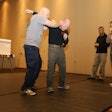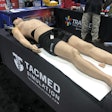The National Public Safety Telecommunications Council (NPSTC) has issued a statement saying the organization agrees with the Federal Communications Commission (FCC) in its ruling promoting public safety's needs for a nationwide, broadband network, to be built out through a public safety/commercial partnership in the 700 MHz band. The FCC announced its plans to revise the 700 MHz rules that will advance interoperability for public safety.
"We applaud the FCC for its decision, which prioritizes first responders' need for 21st century communications capabilities," said Chief Harlin McEwen, Chairman of the International Association of Chiefs of Police Communications & Technology Committee and NPSTC Governing Board member. "While we still need to see the text of the Report and Order, today's announcement is a critical step for the public safety community in our quest to gain an advanced broadband network that will keep pace with our continually expanding duties."
"On behalf of the men and women who serve and protect America's communities, we extend our thanks to Chairman Kevin Martin and all the FCC Commissioners," Alan Caldwell, senior advisor to the International Association of Fire Chiefs' Government Relations Department and NPSTC Governing Board member, said.
"Their careful consideration and unwavering commitment to do what's best for public safety will improve emergency communications - and save lives."
The FCC's Order establishes a framework for a 700 MHz public safety/private partnership between the licensee for one of the commercial spectrum blocks and the licensee for the public safety broadband spectrum. The commercial licensee will build out a nationwide, interoperable broadband network for the use of public safety that the Commission expects "will facilitate effective communications among first responders not just in emergencies, but as part of cooperative communications plans that will enable first responders from different disciplines, such as police and fire departments, and jurisdictions to work together in emergency preparedness and response."
For more information on the National Public Safety Telecommunications Council and its stand on this issue visit www.npstc.org.















